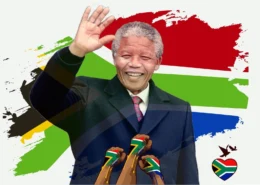Nelson Mandela remains one of the most respected global icons of justice, freedom, and human dignity. His life story — marked by extraordinary courage, sacrifice, and unwavering commitment to equality — continues to inspire millions. From prisoner to president, Mandela’s journey shaped not only South Africa’s history but also the global fight for human rights.
This article explores his early life, activism, imprisonment, presidency, and the legacy he left behind.
Early Life and Foundation of Leadership
Nelson Rolihlahla Mandela was born on July 18, 1918, in the small village of Mvezo, South Africa. Raised in a traditional Thembu royal family, Mandela was exposed early to leadership principles such as responsibility, community service, and justice.
He later attended the University of Fort Hare and the University of Witwatersrand, where he studied law. It was during these years that Mandela became deeply aware of racial injustice under South Africa’s apartheid system — a system that enforced racial segregation and stripped Black South Africans of basic human rights.
Rise as an Anti-Apartheid Activist
Mandela joined the African National Congress (ANC) in the 1940s and quickly became one of its leading voices. He co-founded the ANC Youth League, pushing for a more active and confrontational stance against apartheid.
Key contributions during this period include:
-
Organizing mass protests and strikes
-
Advocating for equality and human rights
-
Challenging unjust laws through legal activism
-
Encouraging Black South Africans to fight against oppression
His leadership made him a target of the apartheid government.
Imprisonment: 27 Years of Sacrifice
In 1964, Mandela was sentenced to life imprisonment in the famous Rivonia Trial, accused of sabotage against the oppressive regime. He spent 27 years incarcerated, mainly on Robben Island.
Despite harsh conditions, he never abandoned his principles. Instead, he became a global symbol of resistance, dignity, and resilience.
During his imprisonment:
-
His message spread across the world
-
Anti-apartheid movements gained massive support
-
International pressure mounted on the South African government
Mandela’s refusal to compromise his ideals strengthened his legend.
Release and Path to Democracy
Mandela was released on February 11, 1990, after international and local pressure forced the government to negotiate. His release marked a turning point for South Africa.
In the years that followed, he:
-
Led negotiations to end apartheid
-
Promoted peace instead of revenge
-
Worked towards creating a multi-racial democracy
His leadership during this transition earned him global admiration.
Presidency: A New Era for South Africa
In 1994, Nelson Mandela became South Africa’s first Black president in the country’s first fully democratic election.
As president, Mandela focused on:
-
National reconciliation
-
Healing racial divisions
-
Building institutions for democracy
-
Expanding human rights and social equality
-
Strengthening education and development
Rather than holding grudges, he prioritized unity, famously saying,
“Resentment is like drinking poison and then hoping it will kill your enemies.”
Post-Presidency and Global Humanitarian Work
After leaving office in 1999, Mandela continued to work as a global humanitarian. Through the Nelson Mandela Foundation, he promoted peace, education, and HIV/AIDS awareness.
He became a moral voice worldwide, advocating for:
-
Children’s rights
-
Poverty reduction
-
Conflict resolution
-
Social justice
Legacy: A Symbol of Courage and Forgiveness
Nelson Mandela passed away on December 5, 2013, but his legacy lives on.
His impact includes:
-
Ending institutionalized racism in South Africa
-
Inspiring international movements for equality
-
Showing that peace can overcome brutality
-
Demonstrating the power of forgiveness
-
Setting a global standard for ethical leadership
Mandela remains a reminder that one person’s courage and determination can change the world.
Conclusion
Nelson Mandela’s life is a powerful story of struggle, resilience, and triumph. He proved that justice is worth fighting for, even at great personal cost. His legacy continues to guide leaders, activists, and ordinary people around the world who believe in freedom, equality, and human dignity.
Mandela’s journey teaches us that true leadership is rooted in compassion, integrity, and the courage to stand up for what is right — no matter how long it takes.

